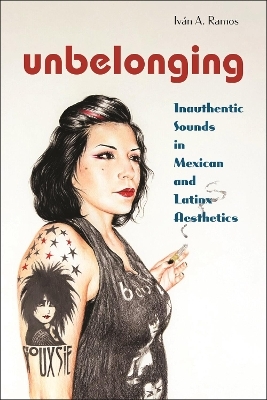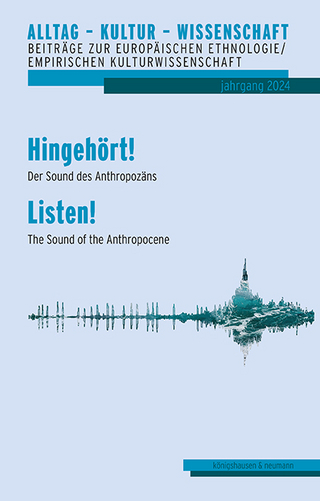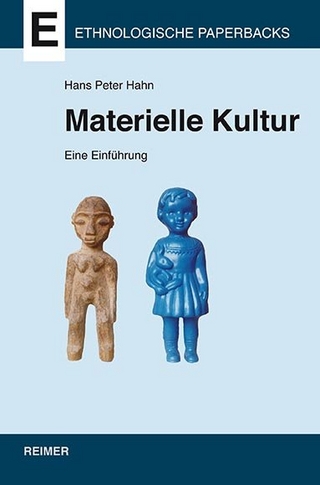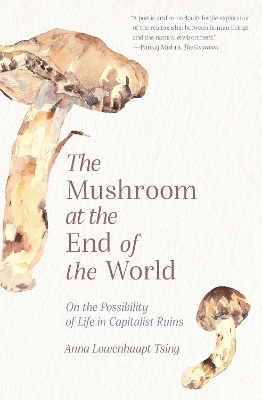
Unbelonging
Inauthentic Sounds in Mexican and Latinx Aesthetics
Seiten
2023
New York University Press (Verlag)
978-1-4798-0846-5 (ISBN)
New York University Press (Verlag)
978-1-4798-0846-5 (ISBN)
How Latinx artists engage in sonic subcultures to reject neoliberal definitions of belonging
What is the connection between the British rock star Morrissey and the Latinx culture of transnational “unbelonging”? What is the relevance of “dyke chords” in Chicana feminist punk and lesbian dissolution? In what ways can dissonant sounds challenge systems of dominance?
Unbelonging answers these questions and more through an exploration into Mexican and US-based Latinx artists’, writers’, and creators’ use of the discordant sounds of punk, metal, and rock to give voice to the aesthetic of “unbelonging,” a rejection of consumerist and nationalist mentalities. Iván A. Ramos argues that racial identity and belonging have historically required legible forms of performance. Sound has been the primary medium that amplifies and is used to assign cultural citizenship and, for Latinx individuals, legibility is essential to music perceived as traditional and authentic to their national origins. In the context of twentieth-century neoliberal policies, which cemented the concept of “citizen” within logics of consumerism and capitalism, Ramos turns to focus on Latinx artists, writers, and audiences, who produce experimental and often “inauthentic” performances and installations in sonic subcultures to reject new definitions of economic citizenship.
Organized around studies of a number of artists, all whom are explored through the methodological frameworks of sound studies, performance studies, and queer theory, Unbelonging unearths how their very different genres of music share a unifying theme of dissonance. With the backdrop of neoliberalism’s attempt to define citizenship in relation to economic and cultural legibility, Unbelonging offers an urgent analysis of how these oft-overlooked queer and feminist performers and fans used sonic illegibility to challenge gender norms, official definitions of citizenship, and narratives of assimilation. Ultimately, these forms of inauthenticity move beyond negation and become ways to imagine alternative realities.
What is the connection between the British rock star Morrissey and the Latinx culture of transnational “unbelonging”? What is the relevance of “dyke chords” in Chicana feminist punk and lesbian dissolution? In what ways can dissonant sounds challenge systems of dominance?
Unbelonging answers these questions and more through an exploration into Mexican and US-based Latinx artists’, writers’, and creators’ use of the discordant sounds of punk, metal, and rock to give voice to the aesthetic of “unbelonging,” a rejection of consumerist and nationalist mentalities. Iván A. Ramos argues that racial identity and belonging have historically required legible forms of performance. Sound has been the primary medium that amplifies and is used to assign cultural citizenship and, for Latinx individuals, legibility is essential to music perceived as traditional and authentic to their national origins. In the context of twentieth-century neoliberal policies, which cemented the concept of “citizen” within logics of consumerism and capitalism, Ramos turns to focus on Latinx artists, writers, and audiences, who produce experimental and often “inauthentic” performances and installations in sonic subcultures to reject new definitions of economic citizenship.
Organized around studies of a number of artists, all whom are explored through the methodological frameworks of sound studies, performance studies, and queer theory, Unbelonging unearths how their very different genres of music share a unifying theme of dissonance. With the backdrop of neoliberalism’s attempt to define citizenship in relation to economic and cultural legibility, Unbelonging offers an urgent analysis of how these oft-overlooked queer and feminist performers and fans used sonic illegibility to challenge gender norms, official definitions of citizenship, and narratives of assimilation. Ultimately, these forms of inauthenticity move beyond negation and become ways to imagine alternative realities.
Iván A. Ramos is Assistant Professor in the Department of Theater Arts and Performance Studies at Brown University. He received his PhD in Performance Studies with a Designated Emphasis in Women, Gender, and Sexuality from UC Berkeley. His writing has appeared in several journals, including Women & Performance: A Journal of Feminist Theory, Studies in Gender and Sexuality, and ASAP/Journal. He was a contributor to the award winning catalog for the exhibition Axis Mundo: Queer Networks in Chicano L.A. sponsored by the Getty Foundation, and he also has articles forthcoming in Turning Archival (Duke University Press).
| Erscheinungsdatum | 17.07.2023 |
|---|---|
| Reihe/Serie | Postmillennial Pop |
| Zusatzinfo | 39 b/w illustrations |
| Verlagsort | New York |
| Sprache | englisch |
| Maße | 152 x 229 mm |
| Gewicht | 376 g |
| Themenwelt | Kunst / Musik / Theater |
| Sozialwissenschaften ► Ethnologie | |
| Sozialwissenschaften ► Soziologie | |
| ISBN-10 | 1-4798-0846-6 / 1479808466 |
| ISBN-13 | 978-1-4798-0846-5 / 9781479808465 |
| Zustand | Neuware |
| Informationen gemäß Produktsicherheitsverordnung (GPSR) | |
| Haben Sie eine Frage zum Produkt? |
Mehr entdecken
aus dem Bereich
aus dem Bereich
Buch | Softcover (2024)
Königshausen u. Neumann (Verlag)
28,00 €
On the Possibility of Life in Capitalist Ruins
Buch | Softcover (2021)
Princeton University Press (Verlag)
19,90 €


